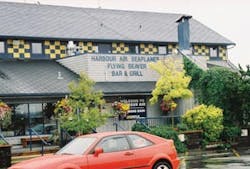RICHMOND, B.C. — Perhaps the overriding message to be conveyed by the employees of Harbour Air Seaplanes is to enjoy the experience. Departing the base here across the street from Vancouver International, one first traverses through the Flying Beaver restaurant, a somewhat legendary part of the experience. The Harbour Air network is also a vital component of the transportation system in southwest British Columbia, and the operator has grown in 26 years to be a major player. The company sees a significant marketing opportunity on the horizon with the upcoming 2010 Winter Olympics; meanwhile, it’s experiencing a steady growth track that has it moving some 300,000 passengers annually. And, it’s touting its role as being a leader in the environmental movement.
Founded in 1982 by Greg McDougall, Harbour Air offers scheduled and charter seaplane flights with a fleet of 35 Beavers and Twin Otters, making it the largest seaplane airline in the world, says the company. Comments Randy Wright, senior vice president of sales and marketing, “Greg’s had quite a vision, to take it from that Bush plane mentality to a legit airline. He’s accomplished that. We do corporate and government as well; in the summer months we do a lot of tourists.”
Harbour Air’s primary market is downtown Vancouver to downtown Victoria, an across-the-bay route that accounts for some 65 percent of its traffic, according to Wright. In a region dominated by mountains and water, road access is at a minimum, providing a need for the seaplane link. Summer tourism is a big part of Harbour Air’s revenue stream as well.
“We give a wholesale rate to tour operators throughout the world, whether it’s England, Australia, Japan, wherever,” explains Wright. “They package it up and sell their product; they move a lot of volume.
“We’re seeing more Europeans this season; the Americans are missing in action this year. We are definitely backfilling with Europeans; but there’s a very large growing market with Mexico, and Australia is a very big customer of ours.”
Wright says the company’s annual revenues, now at $30 million, have doubled in the eight years since he joined the company. Some five percent of those revenues, he says, are spent on marketing.
Explains Wright, “The owner and myself believe in heavily marketing our product. We’re also very heavily involved in the community. We give thousands of trips away to charities in all our communities. We support sports teams, golf tournaments, charities, etc. So we’re very visible among these charities.” That visibility is quite evident to visitors to Vancouver, be it on signage or shuttles. Wright says the company sees the 2010 Winter Olympics, which will likely interfere with Harbour Air’s normal operations, to be a marketing boon.
“There will be security restrictions in play and air zones around greater Vancouver, including the airport. It will slow us down a touch.
“I’m on the tourist board of Victoria and Vancouver Island. What we look forward to and the opportunity that we’re very excited about is the media and television exposure -- three billion people will have their eye on Whistler and Vancouver. We experienced this back with Expo [World Exposition on Transportation and Communication] in 1986; the world came, and they came back afterward.
“We see a great opportunity for the exposure of British Columbia in all those media markets. Tourism British Columbia is doing a great job on that, and the Internet will play a large role.
“We will be able to show the world supernatural British Columbia.”
An employee initiative
Harbour Air also markets itself as the first fully carbon-neutral airline, a move that predated the recent implementation of an inter-province carbon tax in British Columbia. Depending on trip length, customers have 40 to 50 cents added to each ticket for the carbon offset.
Effective October 1, 2007, Harbour Air began to purchase carbon offsets to mitigate the climate impact of all operations. The company instituted a policy to track, reduce, and offset its corporate greenhouse gas emissions by January 1, 2008. The venture was created in partnership with Vancouver-based Offsetters Climate Neutral Society, a not-for-profit company that invests funds from Harbour Air and other clients into renewable energy and energy efficiency projects that would not have taken place without its involvement.
Explains Wright, “We started with a voluntary carbon offset; this was brought up through the grassroots, through our young employees. They were asking, what were we doing for the environment as a corporation? We hooked up with Offsetters and decided to go on a voluntary program. You could offset your flight if you wished. Later we decided to make it mandatory.
“And we also decided that we would look at our corporate footprint and offset that as well, and we would pay into the offset program as a corporation.
“The public has accepted it very well. Many now say they will be flying with us because of our carbon neutral program. So, we haven’t had any hiccups on that; it was well embraced by the community. I was really surprised.
“This is totally independent of the British Columbia program. We’re doing projects that are in our locations – an underground heat source program that would not have been done; greenhouses in the delta close to Richmond; and we’re looking at other projects with Offsetters.”





